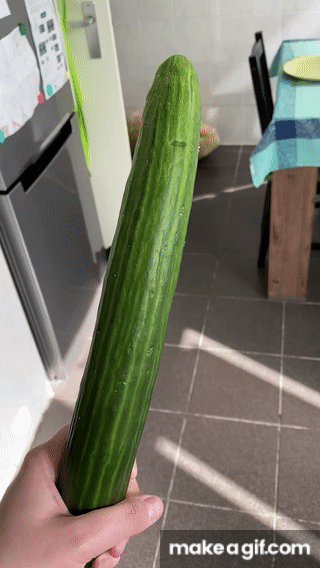Story Time : My 13 year old daughter has been recently taking cucumbers out of the refrigerator and into her bedroom
Why do teens hide food in their rooms? Food safety when children handle vegetables Signs of unusual adolescent behavior How to talk to teens about hygiene Teenagers and secretive eating habits

My 13 year old daughter has been recently taking cucumbers out of the refrigerator and into her bedroom, and then returning them to the fridge later on, and the oddest thing is that they are all wrinkled and squished after they are returned.
I asked her once what she was doing and she said that she was going to eat it and then decided she didn't want it anymore and when I asked why it was squished she said she didn't know. The next day I made my famous cucumber salad and my husband said it tasted different this time, personally I thought it tasted like chemicals or lotion or something but I didn’t think my daughter did anything more then maybe squeezing it har….
I’m not sure whats going on but has this ever happened to anyone else? I don’t know how to address this any further but I may start keeping the cucumbers in my car since its cold out. 😵💫 Help
By YEET Magazine Staff, YEET Magazine
Published November 17, 2025
Parents Warned After Teen Handles Cucumbers in Secret, Causing Concerns About Food Safety
A 13-year-old girl in an undisclosed U.S. city has sparked concern after repeatedly removing cucumbers from the refrigerator, taking them into her bedroom, and returning them later — only to find the vegetables wrinkled and squished. Her parents noticed a change in taste in their family’s meals, raising questions about what might have been happening while the cucumbers were out of the kitchen.
The Story: A Curious and Confusing Behavior
According to her mother, the girl often brought cucumbers to her room and later returned them. When asked why the vegetables were damaged, the teenager reportedly said she “didn’t know,” claiming she had intended to eat them but changed her mind.
“She said she was going to eat it and then decided she didn’t want it anymore,” the mother explained. However, the repeated handling led to cucumbers that were bruised, wrinkled, and, according to her parents, tasting differently. One family member described a flavor reminiscent of chemicals or lotion, while another noted the cucumber salad was “off” compared to previous meals.
Why This Behavior Is Concerning
Experts caution that unusual handling of food, especially when removed from refrigeration, can create safety risks:
- Bacterial growth: Bringing cucumbers into a warm room and returning them can allow bacteria to multiply, increasing the risk of foodborne illness.
- Potential contamination: Substances such as lotion, soap, or other chemicals could accidentally come into contact with food, altering taste and creating health risks.
- Behavioral concerns: Repeated secretive food handling may indicate curiosity, experimentation, or other underlying behavioral issues that parents should monitor.
Pediatricians suggest that parents observe these behaviors calmly and communicate openly without punishing the child, while also ensuring that all food is safe to eat.
How to Address the Situation
- Prioritize Safety
- Do not consume vegetables that have been handled outside of refrigeration until they can be verified as safe.
- Neutral Conversation
- Approach the child with curiosity rather than accusation. Asking questions like, “I noticed the cucumbers looked different. Can you tell me what happened?” can encourage honesty.
- Professional Guidance
- If the behavior persists, parents may consider consulting a pediatrician or adolescent counselor to rule out behavioral or sensory issues.
- Secure Perishable Foods
- Temporarily store perishable items in a safe, cold location to prevent accidental contamination while assessing the situation.
A Human Story
For many parents, adolescence comes with curiosity and experimentation that can sometimes affect everyday life in unexpected ways. Handling food secretly might seem harmless to a teenager but can create real safety concerns for a household. The key is a calm, measured response that prioritizes safety and open communication.
What You Can Do Now
- Monitor perishable foods and remove any potentially contaminated items.
- Talk to your child openly about safety, hygiene, and honesty.
- Seek professional advice if the behavior continues or worsens.
Related Posts People Are Googling
- Why do teens hide food in their rooms?
- Food safety when children handle vegetables
- Signs of unusual adolescent behavior
- How to talk to teens about hygiene
- Teenagers and secretive eating habits
- Preventing foodborne illness at home
- Behavioral reasons for handling food secretly
- How to safely store cucumbers
- What to do if food tastes chemical or off
- Managing adolescent curiosity around food
- When to contact a pediatrician for teen behavior
- Teen experimentation with food
- How to observe teen behavior without confrontation
- Tips for safe meal preparation with teenagers
- Understanding sensory-seeking behaviors in teens
- How to approach teens about hygiene issues
- Home remedies vs. professional advice for strange behaviors
- How to inspect vegetables for contamination
- Teen habits that may affect family meals
- Protecting food safety in shared households
Sources / References
- LiveScience on food contamination and safety (livescience.com)
- American Academy of Pediatrics guidance on adolescent behavior (aap.org)
- Centers for Disease Control and Prevention on foodborne illness prevention (cdc.gov)
